
- Home
- Leadership
- Leadership
- Parth Jindal and JSW Sports: Building India's Olympics ecosystem
Parth Jindal and JSW Sports: Building India's Olympics ecosystem
In 2024, 41 JSW athletes-supported directly by the company and through collaborations with other federations—made it to the Paris Olympics. A look into how Parth Jindal masterminded a brand overhaul using sports, and how he's building upon India's Olympic hopes

Kathakali has been a journalist for a decade and a half, working previously with The Telegraph and Times of India. An MA in political science and a Chevening Fellow, she is a feature writer covering themes as varied as sports, F&B, pop culture, startups. She hosts Sports UnLtd, a podcast on the business of sports, and runs a monthly column, From The Field, featuring elite athletes. She is also part of the newsdesk, where she edits and rewrites stories, and puts the print edition to bed. Kathakali is a sports nut and collects autographs as a hobby. She enjoys travelling and music, and you'll often find her humming completely out of tune.
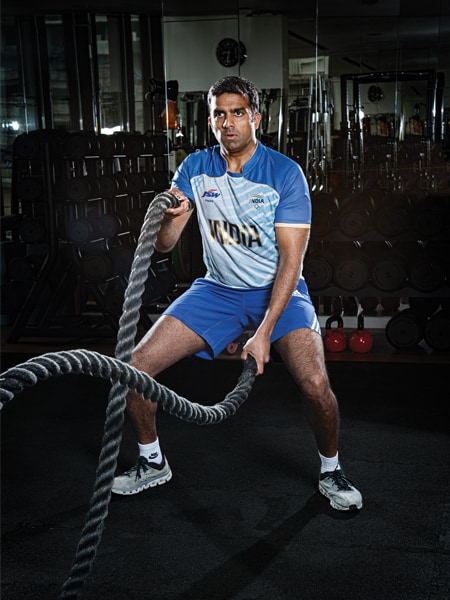 Parth Jindal, founder,
JSW Sports & IIS
Image: Mexy Xavier
Parth Jindal, founder,
JSW Sports & IIS
Image: Mexy Xavier
On a gloomy monsoon day in Mumbai, Parth Jindal’s face lights up when he speaks about a childhood routine. “When we were young,” says Jindal, the scion of the illustrious business family, “we’d go to the club around 6.30-7 every evening. My father would play squash, my mother would play badminton, and us kids something else. Then we would all have dinner together and return home.”
Related stories
During his growing-up years, sports remained a recurring theme in Jindal’s life. He says he played inter-school cricket and football, reached the state level in table tennis and represented the country in squash. Later, as he moved to boarding school in the UK at 16, and then to Brown University in the US for undergraduate studies, he kept the sportsman in him alive by playing squash and even representing his college in the NCAA for a year.
It’s perhaps no coincidence that when his father Sajjan Jindal, chairman of the JSW Group, handed him his first assignment upon returning to India—to identify why their TMT rods lagged Tata’s in market share despite the latter commanding a 10 percent premium, and fix it—Jindal Jr found the answer in sports.
“I went to states like Kerala, Tamil Nadu, Karnataka as an incognito buyer and saw that even our biggest dealers were recommending Tata Steel’s products,” says Jindal. “It dawned on me the power of the brand that the likes of Tata had in steel, Birla had in cement, Asian Paints had in paints. How could JSW, as a B2B company, compete with them through advertising? I felt sports was a great way to build our brand.”
In 2012, he incorporated JSW Sports, a vertical within the parent company, and launched the Sports Excellence Programme (SEP) to support promising athletes. Mustafa Ghouse, former tennis player and Asian Games medallist, was roped in as its CEO (Ghouse is now a director with JSW Sports).
“The SEP provided athletes with a coach or physiotherapist, planned their training, helped with injury rehab, funded trips to international competitions, liaised with federations and the governments for approvals, helped unlock funds available to them etc,” says Jindal.
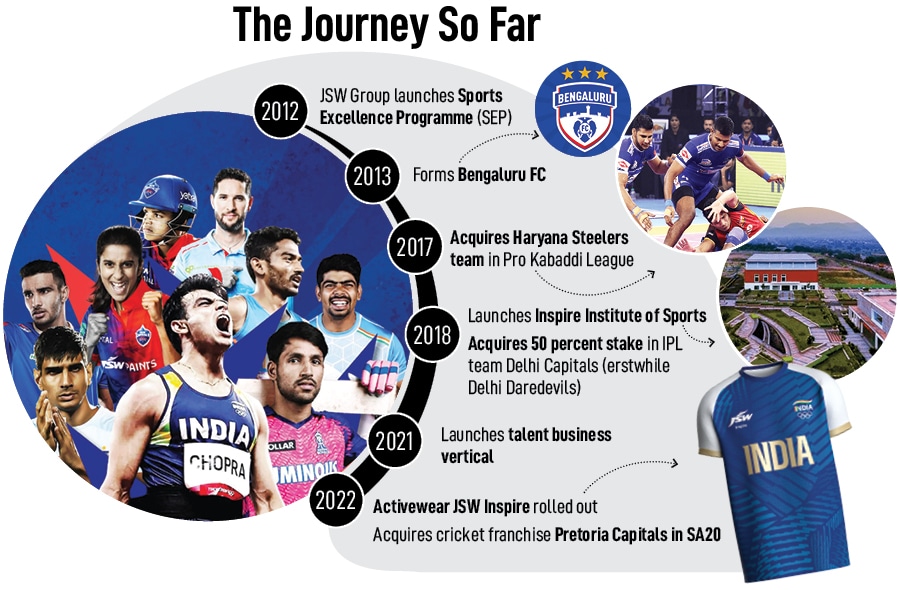
In 2013, the programme allocated Rs 5 crore annually; by 2016, it shot up to Rs 20 crore, and now stands at Rs 120 crore. Through the SEP, athletes like Neeraj Chopra and Sakshi Malik came within the JSW fold much before their medal-winning headline act at the Olympics. Chopra, for instance, was scouted in 2015, a year before he even logged a world record in the under-20 world championships. And in Rio 2016, in the first Olympic Games since JSW Sports was rolled out, 11 of its athletes qualified.
Eight years later, 41 JSW athletes (supported directly by the company and through collaborations with other federations) made it to the Paris Olympics—comprising 35 percent of the 117-strong Indian contingent—up from 25 in Tokyo 2020. Aside from Chopra, two-time Olympic medallist and now the poster boy of Indian sports, JSW also has two other Olympic medallists in its cohort—Malik and Bajrang Punia, bronze-winning wrestlers from Rio 2016 and Tokyo 2020, respectively.

IIS & High Performance
Jindal, however, knew that the SEP wouldn’t be an end in itself; if anything, it would just lay the cornerstone to build an idea that tennis legend Mahesh Bhupathi had seeded in him over a lunch meeting in New York, when he was working at a hedge fund after graduation.“I was called to the office of the fund’s Indian partner and was told Bhupathi wanted to take me out for lunch,” says Jindal. At lunch, the former World No 1 told Jindal the only thing that stopped Indians from winning medals at the Olympics was the lack of world-class training infrastructure. “He said he was trying to get Indian corporates to build a high-performance centre for Olympics training, and that he had pitched this to a number of corporates, including my father, but no one had bitten the bullet,” adds Jindal. It’s a thought that stayed with him long after the lunch was done and dusted.
When Jindal first brought it up with his parents, his father asked for a financial estimate. On being told it would cost around Rs 50 crore, he threw his hands up and asked him to take the idea to the JSW board. When he pitched to the board, armed with an animated video of what the centre would look like, the members weren’t convinced. “They told me they will back me only if someone other than JSW cut me a cheque of over Rs 1 crore,” says Jindal. “I wrote cold emails to every top business family in the country, and got rejected by everyone except the Enam Group in Mumbai. They gave me a cheque of Rs 5 crore. With that, I came back to the JSW board, which then sanctioned the funds in end-2014. It was the happiest day of my life.”

Ravneet Gill, then the CEO of Deutsche Bank, was one of the senior corporate leaders that Jindal reached out to raise CSR funds for the centre. A few days after the meeting in December 2017, Gill ran into Jindal Sr. “He told me, ‘Parth says there are certain businesses like cement and paints where we need to have a retail presence. And the best way to build a retail business is through sports because it gives us instant connect with customers’. I told him, ‘While that’s a great business strategy, he’s also doing this out of genuine love for sport’. That’s what differentiates Parth from others,” says Gill, now the founder of New Horizons Alliance (NHA), which is engaged in education, sports leagues and esports. NHA has also stitched a knowledge partnership with JSW Sports around AISTS (India), the world’s pre-eminent sports management and technology programme.
In 2017, Jindal’s vision came alive as the Inspire Institute of Sports (IIS), the country’s first privately funded high-performance training centre, across 42 acres, opened to athletes at Vijayanagar in Karnataka (it was officially launched in 2018). Set up with a capex of Rs 150 crore and led by CEO Rushdee Warley, a former high-performance manager in swimming for South Africa and later a performance consultant for New Zealand, it integrated the SEP within it to train elite athletes while also launching a developmental programme for younger athletes from across the country.
Also read: Parth Jindal and the making of an institution of the future
That apart, it became a one-stop shop for athletes to access all key aspects of sports—from training and physiotherapy, to injury rehab, nutrition and cutting-edge sports science. This is where Chopra worked on his strength and conditioning post an elbow surgery in 2019, before joining the national camp and heading to the Tokyo Games where he won the gold in men’s javelin. This is where national kabaddi captain Pawan Sehrawat went for rehab following an injury during the ninth season of the Pro Kabaddi League (PKL). “IIS is like an athletes’ community, which was a motivation in itself,” he told Forbes India in an earlier interview. “At times, when I felt I could do only eight reps of an exercise, they pushed me to add four more.”
Says Ghouse: “When we opened the institute, and had the first group of athletes coming in, we invited their parents too to the institute. We told them, here’s where you are going to be for the next three to four years; if you’re comfortable please stay, if not, we won’t stop you from leaving. No one left.”
Ghouse adds that IIS brought in structure and planning, a key element missing from the Indian sports ecosystem where everyone was doing their own thing. “Earlier, there was no centralised platform. We had to start off by educating both coaches and athletes—from nutrition to training loads to competition schedules,” he says. “The perception in India was that you needed to go and kill yourself every day, otherwise it wasn’t a productive day. That’s why you see so many injuries. With science, we brought in planning, periodisation in training.”
At Tokyo 2020, the first Games since the launch of the IIS, 10 athletes from the institute qualified; the number shot up to 20 for the Paris Games. “We are targeting at least 40 for the LA Games in 2028,” says Manisha Malhotra, a former tennis Olympian and now head of sports excellence and scouting for JSW Sports. “We have a flagship programme where we support elite athletes, but the big onus on us is to give India a pool of 10,000 athletes, which will be part of the whole ecosystem.”
 (From left) Current long jump National Record holder Murali Sreeshankar undergoes rehab at the IIS; head of the IIS Men’s and Women’s wrestling programme, Iranian Amir Tavakolian; IIS’s Kotak Karma Boxing Programme enabled Preeti Sai Pawar and Nishant Dev qualify for the Paris Games
Image: Courtesy JSW Sports
(From left) Current long jump National Record holder Murali Sreeshankar undergoes rehab at the IIS; head of the IIS Men’s and Women’s wrestling programme, Iranian Amir Tavakolian; IIS’s Kotak Karma Boxing Programme enabled Preeti Sai Pawar and Nishant Dev qualify for the Paris Games
Image: Courtesy JSW Sports
Think Global, Act Local
Before the institute opened, Jindal and Ghouse hopped global multi-sports facilities that were ahead of the curve to learn and bring back their best practices to India. Their pit stops included the South Australian Sport Institute in Melbourne, the English Institute of Sport in Manchester, the Arsenal Academy, the Ajax Academy and the Barcelona Academy.The practices that they imported were not merely sporting, but also administrative. For example, IIS’s funding model was inspired by the Colorado Springs facility in the US (a training centre for Olympic and Paralympic athletes) that runs on corporate donations. “In the US, the top country for Olympic sports, funding comes through public-private partnership [PPP]. I found it to be a beautiful model and decided to replicate it here,” says Jindal.
IIS now has 47 corporate donors, who, apart from donations, back specific programmes. Mizuho Bank, for instance, recently signed up to support swimming, while Gameskraft has picked up athletics. “Our investments include financial support for infrastructure development, training facilities, and sports science advancements. We also support initiatives that enhance coaching and athlete welfare,” says Rishi Wadhera, vice president-corporate communications and CSR, Gameskraft.
“On the sports development piece alone,” adds Jindal, “we spend around Rs 120 crore a year. Of that, the JSW Group gives Rs 50 crore and we raise another Rs 70 crore of CSR funds.” The company projects a 24 percent growth in donors for FY25.

The funding not only encompasses the Vijayanagar centre, but also four satellite centres across India. IIS has tied up with the Sports Authority of India (SAI) and Haryana Agricultural University in Hissar for combat sports, with the Manipur government for a judo centre, with the Odisha government for its swimming programme, and has a high-altitude boxing centre in Himachal Pradesh; it has also signed up with the Uttarakhand government for another high-altitude centre. In another example of the PPP model, it has forged strategic partnerships with national federations like boxing and judo, and the National Rifle Association, among others, hosting athletes for training camps, trials, national championships and even helping them through rehab.
The satellite centres will double as feeders to the Vijayanagar unit. Says Malhotra, “Until now, IIS has been functioning as pretty much everything. We’ve had people come in at 12, 13, 14 years, and we’ve groomed them to where they are now. As IIS grows, we are using the Vijayanagar centre to become more high performance and more geared for the top juniors and top youths. IIS is a very important cog in the whole wheel of performance, but we are trying to increase numbers at the grassroots.”
Along with the traditional pockets of sports excellence, like North India for boxing and wrestling, and the Northeast for judo, JSW scouts are fanning across the country to spot talent from other regions. “Sports in India is still demographically concentrated,” adds Malhotra. “We are trying to infiltrate other pockets. For example, we support a wrestling akhada in Karnataka that has no culture of the sport. We are in touch with 35 scouts, clubs and coaches almost daily to look for talent.”
Since its inception, IIS has focussed on five sports: Track and field, swimming, boxing, judo and wrestling. Of these, track and field and swimming were chosen with an eye on the high number of medals that are up for grabs, while boxing and wrestling made it to the list riding on India’s pedigreed history in the Olympics—from KD Jadhav (1952) to Sushil Kumar (2008) and Vijender Singh (2008) to MC Mary Kom (2012).
Judo was included following Jindal’s trip to Japan. “There, we saw the judokas and wrestlers cross-training. We saw that’s what gives Japanese wrestlers such leg strength, while Indians were top-heavy,” says Jindal. “We realised these were allied sports and decided to include judo as well.”
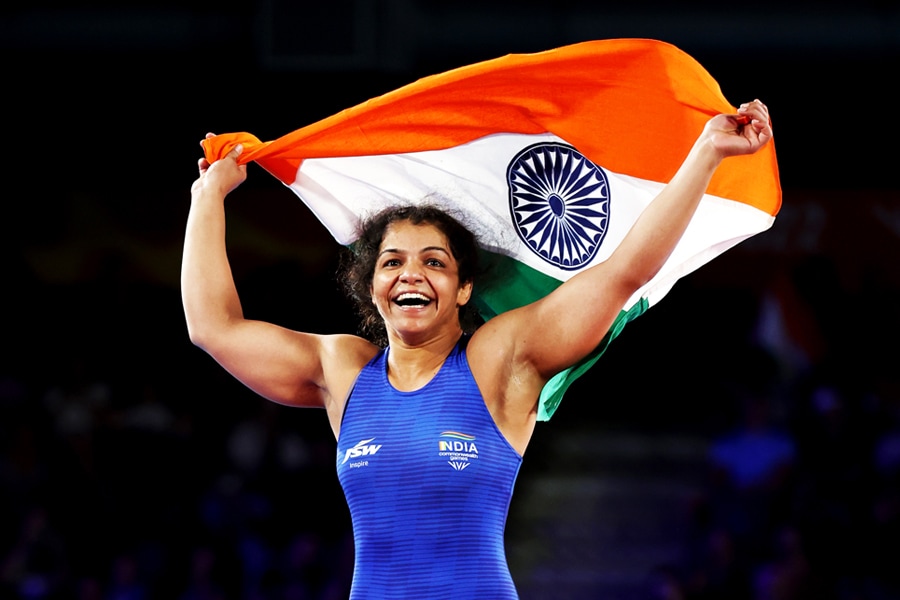 Wrestler Sakshi Malik was among the first JSW athletes to have won an Olympic medal
Image: Al Belloy / Getty Images
Wrestler Sakshi Malik was among the first JSW athletes to have won an Olympic medal
Image: Al Belloy / Getty Images
Catch Them Young
What’s the way into IIS for an aspiring athlete, especially in combat sports where scoring parameters are often intangible and subjective? That’s where a district-based scouts network, including former players and former coaches, comes into play.Once a talented athlete is spotted, they are brought to Vijayanagar for up to three weeks. “During that time, we have the opportunity to assess them from a technical and tactical point of view,” says CEO Warley. “The sports science team will look at them across a number of objective factors which we can measure—musculoskeletal analysis, medical history, blood analysis, cardiac function etc. The final selection boils down to the subjective factors that the coaches are looking at during tournaments and the objective factors that can be measured through science.”
After athletes pass the assessment tests, they have access to state-of-the-art facilities, including a combat hall that’s one of the largest column-free spaces in the country, three boxing rings, four internationally accredited mats each for judo and wrestling. Outside, the complex houses a 10-lane 50 m Olympic size pool and an eight-lane, 25 m swimming pool, with a 400 m athletics track studded with ancillary facilities like four long-jump pits, hammer cage etc. It is also the only privately funded high-performance institute in India to be recognised by the Associations of High Performance Institute in Asia.
“The key is an eye for details,” says Warley, in charge of the 300 athletes at IIS. “Take the four long-jump pits, where each pair is located at opposite ends to account for times the wind changes directions.” Says Gill of NHA: “A big reason why India isn’t a sports superpower is because it doesn’t have enough sports entrepreneurs who can build the enterprises with scale. When you commercialise sport… with that comes accountability. And accountability is the stepping stone for professionalism. That’s what JSW Sports has done.”
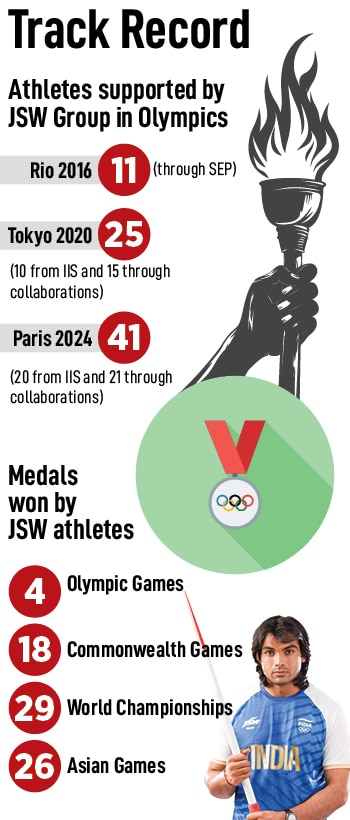
The large-format combat hall at IIS came from what Jindal calls one of the defining moments of sports awareness that came during Rio 2016. “It was the first time I was at the Olympic Games,” says Jindal. “On the eve of the wrestling competition, I was speaking to Sakshi Malik and Vinesh Phogat, both of whom were part of our SEP. They told me, ‘Bhaiya, itna bada hall to humne zindagi mein nahi dekha. Hum to AC mein kushti nahi kiye hai, toh warm-up kaise karenge [we’ve never seen such a big combat hall. We don’t know how to warm up, since we’ve never practised in an AC hall]’. That’s when I decided that the IIS will be built in a way that our athletes will never again be overawed at international competitions.” He adds: “In India, we always say idhar toh aisa hi hota hai [this is how it’s done here]. I want to change that mindset to duniya mein kaise hota hai [how it’s done globally].”
Says Nishant Dev, the boxer who made it to the quarterfinals of the Paris Games: “My foreign camps with JSW Sports and IIS have exposed me to different styles of boxing, which have helped me understand more about the sport. Coming up against a European or South American boxer brings with it different types of challenges, and facing them in a training environment has been crucial. Moreover, several countries have sent their national teams for boxing camps to IIS, which has been helpful for all our boxers at Vijayanagar.”
Dev entered IIS “on April 18, 2017”, as Warley recalls, as a 16-year-old scouted from a sub-junior tournament. “In five years, he is a world bronze medallist and has made it to the Olympics. Here’s a real success story,” he says. “Take the case of judoka Linthoi Chanambam, an 18-year-old who became the first Indian to win a gold in the World Judo Cadets Championship. I still remember the day her coach did a video call with me and told me I’m bringing her, when she was only 11.”
“Then there’s long jumper Jeswin Aldrin,” adds Malhotra. “He had only started competing in long jump a year before he came to IIS. He’s another one who’s made it to the Olympics in quick time.”
Jindal says his greatest joy lies in unearthing talent. “Yes, we supported the likes of Sakshi and Vinesh, but they were already good wrestlers by then. But guys like Nishant, Jeswin… nobody knew them. We scouted them and made them Olympians.”
The Business of Sports
While fostering the Olympics ecosystem remains a priority and passion for Jindal, JSW Sports is also building a for-profit vertical through owning teams, building talent management verticals, monetising content, dabbling with sports marketing etc. It started in 2013 when Jindal, a fan of English club Arsenal, bought JSW’s first sports franchise, football club Bengaluru FC (BFC).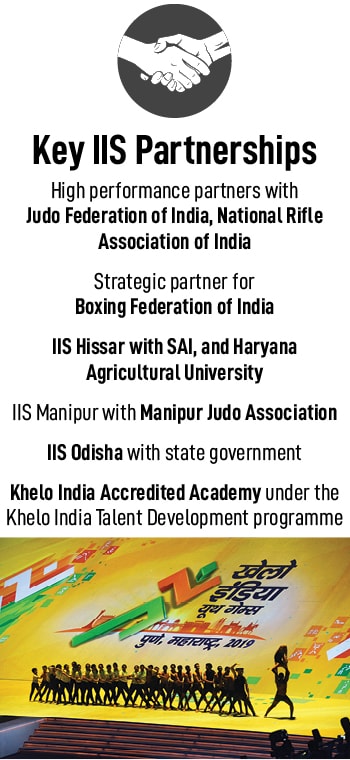 “It was a day I was in mourning because Arsenal was thrashed 2-8 by Manchester United. My father told me that you are neither a Londoner nor British,” he says. “Why don’t you do something for football in India instead and pick up one of the two clubs that the I-league is incorporating?” His conviction was vindicated the very next year as BFC managed to win the I-League title in its very first year.
“It was a day I was in mourning because Arsenal was thrashed 2-8 by Manchester United. My father told me that you are neither a Londoner nor British,” he says. “Why don’t you do something for football in India instead and pick up one of the two clubs that the I-league is incorporating?” His conviction was vindicated the very next year as BFC managed to win the I-League title in its very first year.
Over time, JSW Sports’ franchise portfolio came to include PKL team Haryana Steelers, Indian Premier League (IPL) team Delhi Capitals (in a joint venture with GMR) and Pretoria Capitals in SA20, the IPL-style domestic cricket league in South Africa. Jindal will also own a franchise in the upcoming domestic hockey league slated to start towards the end of the year.
Alongside, the company is also aiming to close the loop for athletes by adding commercialisation and brand management for them. “We’ve been part of Neeraj Chopra’s journey—from scouting him to 2015 to the Tokyo Olympics, from a time when he had only three to four brands to today when he has a roster of 21,” says Divyanshu Singh, COO, JSW Sports, who is leading the charge on that front.
The company’s sports marketing vertical, launched in 2021, has inked over 100 deals in the last fiscal alone—across tournaments like PKL, IPL, WPL, ISL, the Professional Volleyball League and its own portfolio of athletes—valued at Rs 150 crore. In 2023, JSW Sports facilitated Qatar Airways’ three-year deal with IPL team Royal Challengers Bangalore; valued at Rs 75 crore, it’s said to be among the most expensive deals in the history of the tournament.
Adds Singh: “While sports sponsorships have been growing on an average at about 10 to 15 percent, in Indian sport, over the last decade, cricket has dominated 90 percent of the market size in revenue shares. That’s the one story we are most keen to change, and explore the potential for growth that other sports have.”
In 2022, JSW Sports launched its activewear line JSW Inspire, and rolled it out as the kit sponsors for, first, the Commonwealth Games, then the 2023 Asian Games, and now the Olympics. “I am not sure if we are going to make this a business vertical and scale this up,” says Jindal. “All I want is to see Indian athletes wear quality kits made by an Indian brand.”
Nonetheless, with four sports teams and the sports content and marketing verticals growing bit by bit, he believes JSW Sports is the best-positioned sports entity in India to go public. “I want to IPO, maybe not immediately, but at some stage this can create a lot of value,” he adds.
In terms of creating value for India’s Olympic sports, Jindal is taking a lesson out of how the parent company, the JSW Group, plans and works on a long-term vision. Similarly, Jindal’s sports vision for India is being guided by what the nation can achieve in LA 2028 and Brisbane 2032. “We’ve started our swimming programme last year, we want to create an A qualifying time swimmer from IIS and the Odisha programme by the LA Games and a medal winner by 2032,” he says.
Jindal’s passion for sports has rubbed off on his kids too. “Just the other day,” he says, “my daughter won a gold in her school 50 m dash and came to me and said, ‘Look, I’ve won an Olympic medal’. I told her, ‘Very well done, but this isn’t an Olympic medal. Stay at it, and you’ll get there’.”
And that’s the mantra Jindal, too, lives by.
(This story appears in the 23 August, 2024 issue of Forbes India. To visit our Archives, click here.)

















